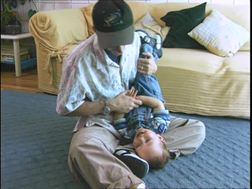
Corporal Punishment "Loving Smacks" 1999
Distributed by Films Media Group, PO Box 2053, Princeton, New Jersey 08543-2053; 800-257-5126
Produced by Victor Schonfeld
Director n/a
VHS, color, 51 min.
High School - Adult
Child Development
Date Entered: 11/09/2018
Reviewed by Christopher Hebblethwaite, Penfield Library, SUNY OswegoThis program advocates not using corporal punishment as a means of disciplining children. The film is set in England but the content can be easily applied to U.S. culture. Both children and adults are asked about their experiences of being physically punished. The adults recount their experiences as children and talk about how they believe the discipline they received affected their adult lives. Some of the subsequent effects include destroyed parent/child relationships, sexual dysfunction, criminal activity, attempted suicide, and child abuse. Several families are interviewed about their disciplinary habits and one family in particular is used as a case study. Specialists consulted include:
Dorothy Rowe - a Clinical Psychologist and well published author of books, book chapters and journal literature about topics such as fear, depression, suicide & death, success, self-realization, aging, and life skills. She is the author of Beyond Fear.
Penelope Leach - a Research Psychologist and well-known author about child & infant development, parenting & child rearing and corporal punishment. Her most widely published work is Your Baby & Child.
Murray Straus - Co-Director of the Family Research Laboratory at the University of New Hampshire and a prolific writer of scholarly research about child abuse, child rearing, conflict & violence in the family, and child discipline/punishment.
Richard Lynne - a Psychologist and spokesperson for "Families for Discipline", an organization "to preserve and uphold the freedom of parents to employ and delegate the use of moderate and reasonable corporal discipline, administered with love and self-control, as one among a number of legitimate and effective methods in the nurture and discipline of their children."
Those who were interviewed about the discipline they received mentioned that verbal abuse, emotional abuse, and even sexual abuse accompanied their punishment. Unfortunately, the creators of this video did not address the relationship between corporal punishment and these forms of abuse. It seems that they would rather have the viewer believe that corporal punishment by itself leads to poor parent/child relationships, sexual dysfunction, criminal activity, suicide, and child abuse. No doubt, corporal punishment can play an important role in the development of these tragedies, but for one to make an informed response to this debate, more information about this relationship should have been presented. Lynne does a poor job of defending the other side of the debate. Neither he, nor anyone else for that matter, provided research or even reasoned support for physical punishment as a helpful means of discipline.
Parents are encouraged to reward right responses by their children with gold stars, but no alternative means of discipline are given. One parent spoke about how he pursued group support to resist hitting his child and to reduce the stress between him and his child by improving the quality of their communication. More alternatives would have been helpful.
The cinematography is fair, much like one would see on 20/20 or Dateline. The film is appropriate for high school level students through adults and would be useful in both public and academic libraries. All in all, I recommend the program but encourage its use in conjunction with open, critical discussion.